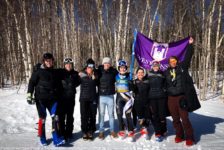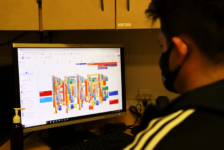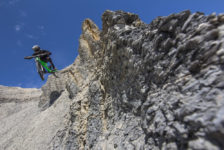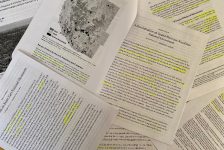
Julian Amaral, Evan Healy, Casey Sullivan and Tyler Pirruccio gather around a fire after a day of backcountry skiing. Healy and Sullivan came from New England to visit friends in the Central Wasatch Mountains because they’ve heard so much about the place, and both said they will be back soon. Photo by Andrew Nassetta.
Many students at Westminster College enjoy recreational activities in the Central Wasatch Mountains but some aren’t aware of the Mountain Accord and how the future planning will affect transportation, resources and recreation in the range.
According to Mountain Accord’s website, planning will benefit current and future generations by establishing an in-depth framework that provides long-term protection of the region’s water, lands, recreational opportunities and economic prosperity.
Despite the impact Mountain Accord would have on the Wasatch, not all students are aware of what the agreement does to their backyard.
“I have heard people talk about Mountain Accord in my class and no one seems to have any idea what it is,” said Molly Karasick, a Westminster junior communication and Spanish double major from New Jersey. “All I know is that it is a group of people trying to preserve the Wasatch mountains from overdevelopment.”
Prominent figures in the Mountain Accord coalition suggest students and young individuals need to get involved in the planning process to let their voices be heard.
“It is really important that students and young people have a voice in the Mountain Accord’s future efforts,” said Laynee Jones, Mountain Accord’s program director. “We can structure our planning with students’ input in mind. They are the future and we do not have enough of their input.”

Julian Amaral, 28, ski-tours up Kessler Peak after a day on the job as an MRI Technician at the University of Utah Hospital. Amaral moved from New Bedford, Massachusetts to Salt Lake City in 2013 to pursue a lifestyle that allowed for a professional career and time to follow his passion for snowboarding. Photo by Andrew Nassetta.
Students from all over the state, country and world choose Westminster College because of its proximity to the Central Wasatch Mountains, which allows students to pursue their passions for outdoor recreation while obtaining a college education.
“I don’t see myself being able to have that experience at many other colleges,” said Karasick, who said she came to Salt Lake City for her education and the ample amount of outdoor recreation opportunities available.
Though many members of the Salt Lake community didn’t grow up in Utah, they said they recognize the area’s uniqueness and find the Central Wasatch Mountains worth protecting.
“I am really passionate about the Central Wasatch Mountains,” said Jones, who said she holds a neutral position on the Mountain Accord. “That’s why I moved here from Texas. I feel like this place is pretty special.”
The Mountain Accord is comprised of stakeholders and activists who want a say in the Central Wasatch Mountain’s future.
“We are a coalition of government and private entities, local advocacy groups, federal agencies and the Forest Service who have come together to compromise, negotiate and agree on a future for the Central Wasatch Mountains,” Jones said.
The future of the Central Wasatch Range has also concerned individuals outside of the Mountain Accord, such as Eric Trenbeath, a freelance journalist and Forest Service Utah Avalanche Center avalanche forecaster from the Moab region. Trenbeath said he has been following the Mountain Accord process since it started in 2013.
“[Mountain Accord] has been working to limit development in watershed areas and set aside a lot of terrain for wilderness and national conservation area designations,” Trenbeath said.
Mountain Accord wants to limit the expansion of ski resorts’ base areas and contain economic development, Trenbeath said. Ski resorts, which are large stakeholders in the Wasatch, have swapped high-alpine land for land closer to the base of the resort where development would be permitted.
“I have a glass half-empty perspective on the matter and stakeholders involved but am happy that Mountain Accord has a plan and is taking initiative,” said Greg Gagne, a computer science professor at Westminster College. “Good planning will limit how bad things will get.”
Plans to preserve land for recreational purposes could be the only option to ensure the longevity of these opportunities for future students at Westminster College and the growing population, according to Gagne.
“The valley is not getting any smaller, “Gagne said. “More and more people are moving here.”
According to Utah’s state website, Salt Lake County’s population has increased 2.7 percent in the past decade and is expected to double by the year 2030.
“You can have a professional job and have access to incredible public lands and recreation without living the ski bum life,” said Gagne, who moved to Salt Lake City from Vermont in pursuit of that lifestyle.
Gagne said he has watched the number of recreational enthusiasts increase in the Central Wasatch over the past few years and does not see that changing anytime soon, which he said is the reason the Mountain Accord is important.
The Salt Lake Valley provides access to the outdoors and professional job opportunities like few places in the country. Some students come to Salt Lake City, specifically Westminster College, in pursuit of that lifestyle.
“I came to Westminster to ski and employ my love for the outdoors through the community that exists here [in Salt Lake],” said Alex Mager, a senior from Minnesota who works as a brand manager for RedBull.
Mountain Accord will affect more than the outdoor enthusiast in the Central Wasatch. The ski bum, the desk worker, the CEO and the student will also be affected.
Jones, the program director for Mountain Accord, said the planning process lacks the voice of the student population — the future of the Central Wasatch Mountains and surrounding valleys. Students who share their voice and passion of the Central Wasatch Mountains with Mountain Accord have the ability to preserve the legacy of the Salt Lake Valley and Central Wasatch Mountains for generations to come, Jones said.
Editor’s note: Andy Nassetta works for the Utah Avalanche Center.









